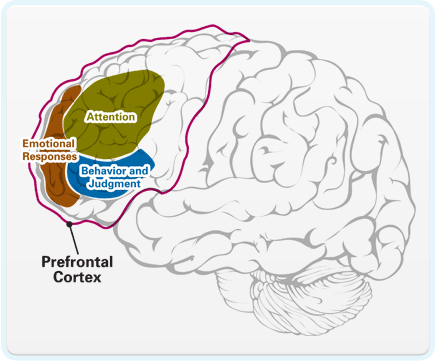
The Science of Self-Control: 6 Ways to Improve Your Willpower Today
One of the key parts of our culture at Buffer is a focus on self-improvement. We each pick an area to improve on each week and share our daily progress and challenges, making it a social, supportive way to adjust, create or change our habits.
There’s still a lot of work to be done for self-improvement to be effective, though. I’ve been through a bunch of different improvement focuses in the last few months, including positivity, running, reading more and learning French. Each one has been fun to focus on, but it’s hard to keep more than one new habit going at a time—partly because it takes so much willpower.
What willpower is and how it works in the brain
Kelly McGonigal, PhD and author of The Willpower Instinct says willpower is a response that comes from both the brain and the body.
The willpower response is a reaction to an internal conflict. You want to do one thing, such as smoke a cigarette or supersize your lunch, but know you shouldn’t. Or you know you should do something, like file your taxes or go to the gym, but you’d rather do nothing.
The prefontal cortex (that section of the brain right behind your forehead) is the part that helps us with things like decision-making and regulating our behavior. Self-control, or willpower, falls under this heading, and thus is taken care of in this part of the brain.

To be effective at controlling our urges and making sound decisions, the prefontal cortex needs to be looked after. That means feeding it with good-quality food so it has enough energy to do its job and getting enough sleep.
How willpower gets depleted throughout the day
McGonigal points out that one of the most replicated findings about willpower is that it seems to be finite—that is, we only have so much and it runs out as we use it.
Trying to control your temper, ignore distractions or refuse seconds all tap the same source of strength.
We can look at willpower like a muscle—it can get exhausted by overuse, but just like our physical muscles, there are some researchers who believe we might be able to strengthen our willpower by training it.
How to increase your willpower
Okay, we know that we only have so much willpower and as we go about our day, stress and normal self-control depletes our resource. Let’s see what options we have for increasing the pool of willpower we have to draw from.
1. Increase your capacity for pressure: Learn how to manage stress
To start with, we need to manage our stress levels, says McGonigal. Being under high levels of stress means that our body’s energy is used up in acting instinctively and making decisions based on short-term outcomes. Our prefrontal cortex loses out in the battle for our energy when high-stress is involved.

McGonigal says that stopping to take a few deep breaths when we feel overwhelmed or tempted can be a great start in managing our stress levels and improving our willpower.
2. Encourage yourself to stick to your plan
To make it even easier, it appears that self-affirmation can even help you to have more self-control when you’re running out, according to a study published in the Journal of Personality and Social Psychology. A good example of this is the difference between telling yourself “I can’t” and “I don’t.” Taking back control of the situation using the phrase “I don’t” has been shown to be more effective at helping you to stick to your plan and break bad habits:
Every time you tell yourself “I can’t”, you’re creating a feedback loop that is a reminder of your limitations. This terminology indicates that you’re forcing yourself to do something you don’t want to do.
So try telling yourself that you don’t do that bad habit, rather than punishing yourself by saying “I can’t.”
3. Get more sleep to help your brain manage energy better
McGonigal also says getting enough sleep makes a big difference to how efficiently our prefrontal cortex works:
Sleep deprivation (even just getting less than six hours a night) is a kind of chronic stress that impairs how the body and brain use energy. The prefrontal cortex is especially hard hit and it loses control over the regions of the brain that create cravings and the stress response.
Luckily, McGonigal also cites studies that have shown we can make this work in our favor by ensuring we get enough sleep:
When the sleep-deprived catch a better night’s sleep, their brain scans no longer show signs of prefrontal cortex impairment.
And if you’re wondering how much sleep is enough, here’s a rough guide: one of the most acclaimed sleep researchers, Daniel Kripke, found in a recent study that “people who sleep between 6.5 hours and 7.5 hours a night, live the longest, are happier and most productive”.
4. Meditate (for as little as 8 weeks)
Meditation has also been linked to increasing the reserve of willpower we have available, as well as improving attention, focus, stress management and self-awareness. McGonigal suggests this can even give fast results:
And it doesn’t take a lifetime of practice — brain changes have been observed after eight weeks of brief daily meditation training.

5. Better exercise and nutrition: The most ignored route to higher willpower
Another great way to train the brain, that is often easily ignored or undervalued, yet can make you a lot more resilient to stress, and thus boost willpower, is regular physical exercise. Both relaxing, mindful exercise like yoga and intense physical training can provide these benefits, though McGonigal points out that we’re not sure why this works yet.
As I mentioned earlier, what you feed your body affects how much energy the prefrontal cortex has to work with. This is why nutrition is so important:
Something as simple as eating a more plant-based, less-processed diet makes energy more available to brain and can improve every aspect of willpower.
Not only will exercise and good nutrition improve your willpower, but they’ll make you feel better as well. Exercise in particular is known for making us happy by releasing endorphins:
These endorphins tend to minimize the discomfort of exercise, block the feeling of pain and are even associated with a feeling of euphoria.
6. Postpone things for later to gain focus on what’s important now
Postponing something you really shouldn’t have can be effective if you’re trying to break a bad habit. In Willpower: Rediscovering the Greatest Human Strength, Roy F. Baumeister explains that people who tell themselves “not now, but later,” are generally less tormented by the temptation of something they are trying to avoid (his example is eating chocolate cake).
A treat for you, since you waited this long
One last thing. You might have heard of a famous experiment using marshmallows to test kids’ willpower. What happens is a child is left alone in a room with one marshmallow for an undefined period of time. If they can resist eating the marshmallow, they’re rewarded with a second marshmallow at the end of the experiment. If they eat the marshmallow before time is up, they only get that one.
It’s been recreated a bunch of times, and this is a really fun video of what it can look like.
Image credits: YlvaS, ADHD & You, Women’s Health Network, Free Meditation
Try Buffer for free
140,000+ small businesses like yours use Buffer to build their brand on social media every month
Get started nowRelated Articles
We’ve written about creativity a few times on the Buffer blog, but it’s hard to keep track of everything we learn about it. One day I’m adjusting the temperature in my workspace, and the next I’m trying to put off creative work until I’m tired. If you’re in the same boat, and you find it’s difficult to remember what will improve your creativity and when you should do your most creative work, hopefully this list will help you get it all straight. 1. Your brain does better creative work when yo
I’ve noticed that the way I spend my lunch break affects how productive I am for the rest of the day: how quickly I get started once I get back to my desk, how effective I am in the first hour after lunch, and how I feel throughout the afternoon. Luckily, we’ve been writing about ways to improve your day for a while now: from tips on making your environment more conducive to creativity to pushing through writer’s block. Why shouldn’t the humble lunch break get the same treatment? I gathered th
Constraints can seem like the last thing you’d want for a creative project, but they’re actually beneficial when it comes to doing good work. If you’ve ever faced the common writer’s hurdle of the blank page, you’ll know what it’s like to be paralyzed by innumerable opportunities. What restrictions do is take away some of the choices available to us, and with them, the paralysis of choice that stops us from getting started. We love trying things that seem counterintuitive at Buffer, but we espe